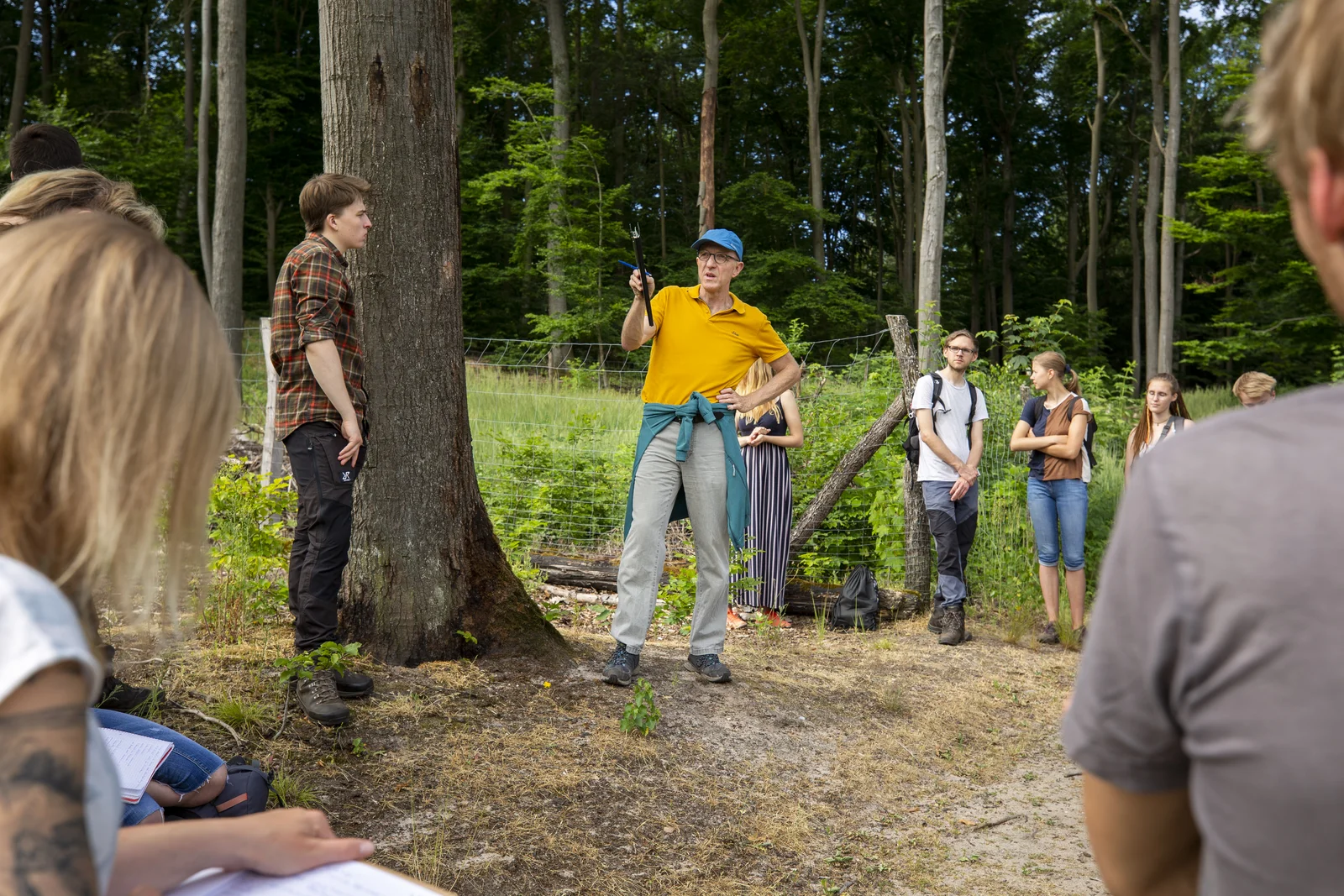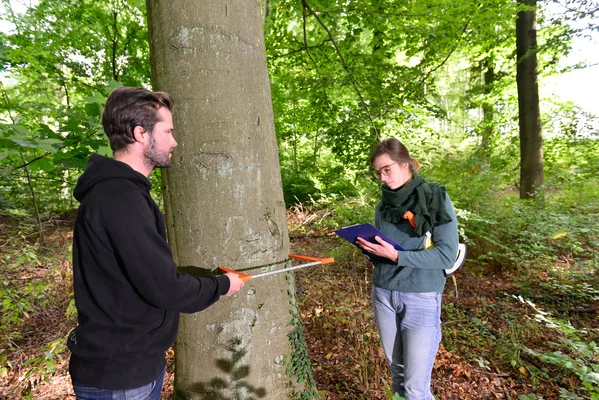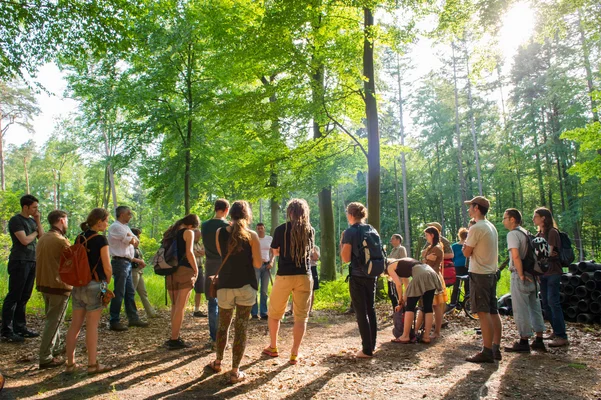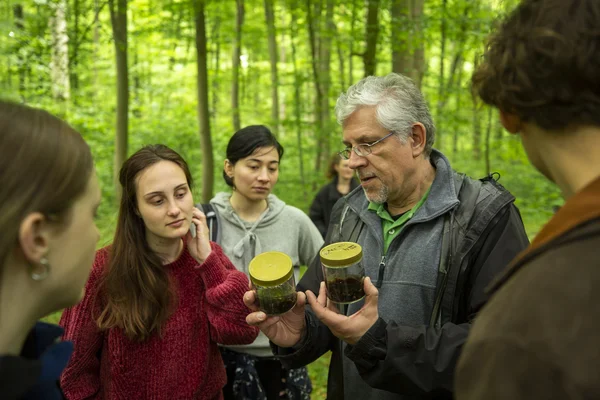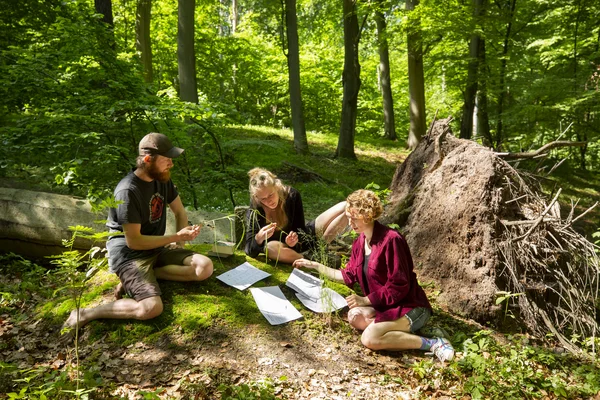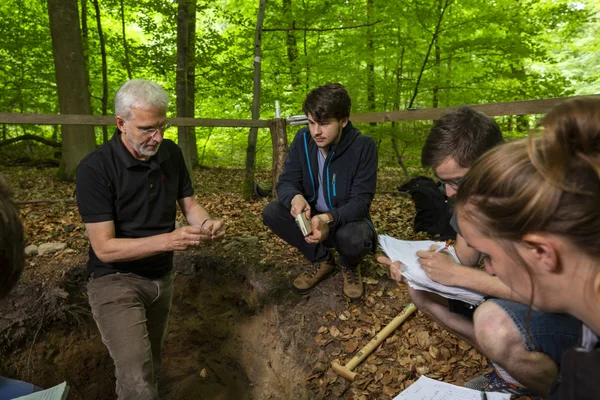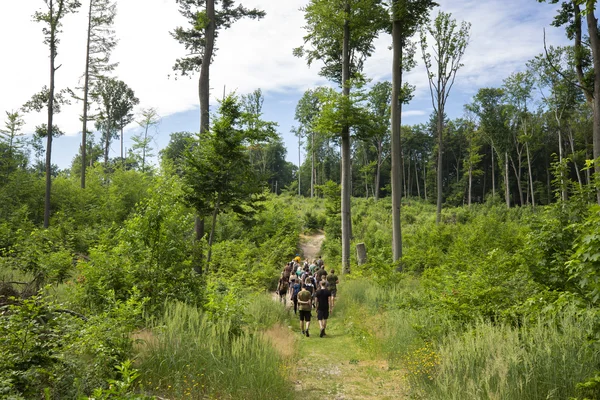Individual study contents
The Bachelor’s degree programme in Forestry (B.Sc.) lasts six semesters, comprises 180 ECTS credits, and provides professional qualification. The average weekly contact hours (semester hours) during the five academic semesters amount to around 22 semester hours for compulsory modules. An additional average of 5 semester hours is allocated for compulsory elective modules. The Forestry (B.Sc.) programme is characterised by a strong practical focus.
Modules per semester
In the first semester, you will learn about the ecological, scientific and social fundamentals of Forestry.
The module consists of general forest botany and woody plant morphology and identification.
You will acquire basic knowledge of morphological structures, cytology, anatomy, physiological processes and systematic relationships of plants with a focus on woody plants.
The module consists of the sections Biodiversity, Nature Conservation and Ecosystem Management and Introduction to Sustainable Development.
You will be able to actively participate in the discussion on current issues and concerns of sustainability, natural resource management and nature conservation. Your knowledge is based on a complex and integrative view and appreciation of ecosystems in which humans are embedded.
The module consists of the parts soil science and site and vegetation science.
After completing the module, you will have basic knowledge of the formation, structure and properties of different (forest) soil types and will be able to use this knowledge to understand the functions of soils in the ecosystem. You will be able to assess forest sites on the basis of climatological, geological and soil science properties as well as vegetation science.
The module consists of the sections General Zoology, Wildlife Biology and Entomological Basics.
You will be able to recognise relevant animal groups and explain their function in the (forest) ecosystem. You will also gain an overview of the biology and ecology of wild animals with a focus on mammals. The focus is on knowledge of wildlife biology and an overview of the way of life of native wild animals relevant to wildlife management. Participants also learn the basics of insects. The aim is to familiarise you with the ecological position and functional diversity of insects.
The module consists of forest policy and basic economics.
You will be able to understand forests and forest management in a political and social context and in particular their conflicts and to formulate contributions to solution approaches and control instruments, taking into account the economic significance of forests and wood. You will be able to understand economic relationships in the context of companies/operations and the environment.
It is generally possible to obtain a hunting licence as part of the degree course. This is associated with additional costs.
During the degree programme, you take the corresponding compulsory elective modules for the theoretical content. The practical training takes place parallel to the degree programme. Both programmes conclude with an examination.
The second semester expands your knowledge of the ecological, scientific and social fundamentals of Forestry.
The module consists of the parts forest ecology, forest construction basics and wildlife management.
You understand ecological processes in (forest) ecosystems and apply this knowledge to practical, sustainable action. You identify influencing factors and risks, develop management strategies, and assess their impact on forests and wildlife. Your expertise enables you to actively contribute to the analysis and development of management plans for forest and wildlife ecosystems.
The module consists of the parts herbaceous plant identification and dendrology.
You are able to use identification literature and possess species knowledge of herbaceous plants. You also have a basic understanding of plant systematics and applied vegetation science. You acquire knowledge of tree ecology and the systematics of selected woody taxa, and you are able to identify selected native and non-native tree and shrub species.
The module consists of the parts dendrometry, biometry and measuring instrument science.
You are capable of independently and efficiently collecting, processing, and analysing basic, predominantly tree-level spatial forest data. You have foundational knowledge in environmental data analysis and are able to design sampling methods. You are familiar with the most important forestry instruments used in forest surveying and understand their purposes and correct application. You are familiar with the practical use of these instruments, as well as typical measurement and device-related errors.
You will be able to differentiate between legal norms and their origin; you will understand the administrative and fine procedures and their differences and will be able to make legally compliant decisions, particularly in the area of forest law, and present these in an appropriate form. You will know the significance of the provisions of the German Civil Code (German Civil Code), which are necessary for the processing of legal transactions such as the sale of timber, leasing and renting of land or the purchase of work equipment. You will know the importance of general terms and conditions for the practical implementation of contracts and can understand important clauses. You will know the most important legal forms for companies and their legal implications as well as the basics of labour law.
The module consists of the sections Academic Writing and Presentation and Communication.
You will learn the basic structure of an academic paper and how to conduct academic research. You will also be able to successfully apply presentation techniques. You will learn how to communicate in a way that is appropriate to the target group and situation.
The module consists of the parts site and vegetation science field exercise (2nd semester) and soil science field and laboratory practical (3rd semester).
You will be able to approach soils in the field and derive their site-ecological properties using field methods. In addition, you will be able to make statements about the main site conditions using vegetation surveys. The results can be used to make recommendations for the selection of tree species on a site-specific basis.
Building on hunting theory I. Part of the theory for the hunting licence.
In the third semester, we teach application-oriented courses focusing on silviculture, forest growth science, forest health, work and process technology, timber utilisation and corporate management.
You are able to select and monitor the appropriate forestry working methods in the context of sustainable forest cultivation. You will be able to apply the basic knowledge of personnel deployment required for the planning and execution of practical forestry work.
You know the relevant wood properties and characteristics and are able to provide wood according to the requirements of the customers.
The module consists of the parts data management, GIS practical exercises and tutorials and geodata and geoinformatics.
As part of the practical application, you will be able to create data tables with their fields and corresponding field data types and recognise structures and dependencies between the data. You will be able to construct functions and expressions for data analysis, interpret results and work on various scientific questions. You will be familiar with data visualisation options and tools and be able to create structured result outputs. You will have basic knowledge in the field of applied geoinformatics, which enables them to acquire practical skills in dealing with spatial data and the use of relevant GIS software for use in modern (digital) Forestry. You will have basic theoretical knowledge in the field of applied geoinformatics and are able to understand practical forestry applications of digital spatial data and automatic sensor data in Forestry.
The module consists of the parts forest metrology, forest growth science and introduction to applied silviculture.
You are able to methodically prepare and carry out basic forest inventories, as well as analyse and interpret the collected stand data. You assess the impact of natural and human influences on the growth, yield, stability, and structure of forest stands, and you analyse the growth dynamics of different tree species in both pure and mixed stands in a differentiated manner. Based on this, you develop and evaluate silvicultural and utilisation strategies using planning tools such as yield tables and simulation models. You can assess the silvicultural potential of native and non-native tree species, taking into account site-specific and ecological conditions. Through targeted species selection and knowledge of basic forest management systems, you are able to establish and manage stable, productive forests that provide a wide range of ecosystem services.
The module consists of the parts site and vegetation science field exercise (2nd semester) and soil science field and laboratory practical (3rd semester).
You will be able to approach soils in the field and derive their site-ecological properties using field methods. In addition, you will be able to make statements about the main site conditions using vegetation surveys. The results can be used to make recommendations for the selection of tree species on a site-specific basis.
You will be able to understand wildlife biology and hunting principles in an ecosystem context and apply them in practice where appropriate.
The module consists of public relations (3rd semester) and forest education/education for sustainable development (4th semester).
You are enabled to become multipliers for nature and environmentally friendly action and acquire tools for dealing with the media and the general public. You will be able to identify and involve various forest-relevant stakeholders and their interests, as well as utilise appropriate conflict resolution strategies.
In this elective module in the 3rd and 4th semesters, basic methodological GIS work steps from the mandatory modules are expanded, deepened and used for the processing of specific Forestry assignments that have already been presented in previous modules. You will work on a complex Forestry issue in the form of project work using modern geodata infrastructures and methods and tools of applied geoinformatics.
The module consists of the parts Phytopathological Principles and Environmental Monitoring (3rd semester) and Applied Woody Plant Pathology (4th semester).
You will be able to identify biotically and abiotically caused plant diseases on woody plants and apply environmental monitoring methods in the forest.
Students have the ability to communicate in English on topics relevant to forestry.
You will have a working knowledge of the most important wildlife survey methods. You will be able to use these methods as a tool for long-term, target-orientated recording and evaluation of the status of wildlife populations.
The module consists of the parts tree care and assessment and damage diagnostics of woody plants.
You will be able to recognise damage to woody plants, differentiate between the causal factors and make a basic assessment. You will learn the scientific and legal basics of the care and restoration of trees and their locations.
You are able to understand agroecological interactions, political framework conditions and the potential of various agroforestry systems and, above all, to assess and evaluate their practical feasibility. You will understand the relevance of the parameters collected on the agroforestry trial area and are able to plan, carry out and analyse a corresponding experimental setup.
You are able to think and work scientifically by recognising the diverse properties of wood as a material in its entirety. You are proficient in the use of identification keys and can identify the most important types of wood.
You are able to understand the development of forests over the last 5000 years and the changing demands of humans on the forest, to evaluate today's forest cultivation against this background and to discuss it with regard to the historical development of hunting.
You can also select elective modules from certain other HNEE degree programmes or from international partner universities that are thematically related to the degree programme.
During the fourth semester, we will expand your application-related knowledge with a focus on silviculture, forest growth science, forest health, work and process technology, timber utilisation and corporate management.
The module consists of the parts timber utilisation and marketing and forest development and logistics.
You will be able to market and supply the raw material wood according to the requirements of the customers.
The module consists of the parts Forest Health and Expertise in Phytomedicine and Entomological Knowledge of Species and Forms.
You acquire knowledge and skills that enable you to assess and react appropriately to abiotic, biotic and anthropogenic disturbances in forest ecosystems. You know the most important organisms in terms of forest hygiene and ecology.
The module consists of forest economics and practical exercises in forest economics.
You will be able to analyse, evaluate and successfully manage business processes in forestry operations under various framework conditions and objectives, especially against the background of the provision and marketing of all relevant products and services.
The module consists of the parts applied silviculture, practical exercises on silviculture and forest inventory and forest inventory and forest management.
You will be able to derive silvicultural maintenance and regeneration measures in forests and ensure their implementation in the form of different silvicultural strategies and operational concepts with special consideration of near-natural forest management.
You are able to implement technical, methodological and planning aspects of relevant forestry work
You are able to put theoretical knowledge and skills in the management of forest ecosystems into practice in a manner appropriate to the situation.
You will be able to survey a forest ecosystem using scientific methods and analyse the survey results. You will acquire practical knowledge of the most important methods for recording vegetation, soil organisms, stands and site factors. You will be able to describe the forest ecosystem on the basis of field investigations and derive specific recommendations for forestry action.
You will be able to analyse the situation of exemplary ecosystems and interpret it in a management-oriented way.
You will have an overview of the biology and ecology of wild animals with a focus on mammals and birds. Another focus is the way of life of native wild animals.
The practical exercises on wildlife management take place during the field trip to Bavaria or Slovakia.
The module consists of the parts forest development for recreational use and road construction.
You will have the basic knowledge required for the planning of recreationally relevant development infrastructure and will be able to implement this in concrete planning measures. You will also acquire practical knowledge for adapted forest trail construction and be able to prepare a project work.
By reflecting on the experiences gained in the context of sustainable engagement in conjunction with the intensive examination of specialised content, you will be able to develop personality-building skills such as communication skills, self-efficacy, teamwork skills and more. You will learn about the importance of civic engagement and will be able to assess and reflect on the opportunities and limitations in relation to your particular area of specialisation.
You have in-depth knowledge of the principles of natural forest management. You are able to apply this knowledge in the context of practical exercises for the recording and targeted further development of different stand structures.
You will be able to understand wildlife biology and hunting principles in an ecosystem context and apply them in practice where appropriate.
The module consists of public relations (3rd semester) and forest education/education for sustainable development (4th semester).
You are enabled to become multipliers for nature and environmentally friendly action and acquire tools for dealing with the media and the general public. Students are able to identify and involve various forest-relevant stakeholders and their interests, as well as utilise appropriate conflict resolution strategies.
In this elective module in the 3rd and 4th semesters, basic methodological GIS work steps from the mandatory modules are expanded, deepened and used for the processing of specific Forestry assignments that have already been presented in previous modules. You will work on a complex Forestry issue in the form of project work using modern geodata infrastructures and methods and tools of applied geoinformatics.
The module consists of the parts Phytopathological Principles and Environmental Monitoring (3rd semester) and Applied Woody Plant Pathology (4th semester).
You will be able to identify biotically and abiotically caused plant diseases on woody plants and apply environmental monitoring methods in the forest.
Students have the ability to communicate in English on topics relevant to forestry.
You will have a working knowledge of the most important wildlife survey methods. You will be able to use these methods as a tool for long-term, target-orientated recording and evaluation of the status of wildlife populations.
You can also select elective modules from certain other HNEE degree programmes or from international partner universities that are thematically related to the degree programme.
In the fifth semester, you can complete the practical semester in Germany or abroad.
The practical semester can be completed in the following organisations:
- Forestry and timber industry organisations
- Environmental and nature conservation authorities
- Development cooperation organisations
- Consultancy and planning offices in the forestry and environmental sector
- Forest and environmental education organisations
Other internships outside of the above-mentioned organisations can be approved on application by the person responsible for the internship.
The practical semester is completed with a project report and its presentation and currently lasts 20 weeks.
In the sixth semester, you will learn about operational management and operational management strategies in the form of interdisciplinary project work and write your Bachelor's thesis.
You will be able to write a scientific paper on a subject-related topic of your choice. In the context of your work, you will be able to formulate subject-specific questions/working hypotheses and develop and apply familiar methodological approaches or new methods. You will be able to analyse data scientifically and present it appropriately. You will be able to evaluate and critically discuss conclusions with results and statements from comparable studies. You are able to write scientifically and are familiar with the principles of good scientific practice.
You will be able to inventory and plan a self-contained forest unit, taking into account all relevant basic and applied specialist disciplines and sustainability criteria. You understand interdisciplinary relationships in forest cultivation.
The module consists of the parts environmental law, forest policy and governance and certification.
You know the nature and components of environmental law and in particular the classification and content of the areas of nature conservation law to be dealt with in depth, especially their forest-related significance. You are familiar with the environmental assessment procedures of the EIA and the FFH impact assessment as well as the special species protection assessment and its significance for spatially significant projects and plans as well as the corresponding procedures, assessment methods and compensation measures. Forest-related impacts are also of particular importance here.
You will be able to familiarise yourself with the currently significant alien and invasive harmful organisms and serious, complex disease phenomena. You will be familiar with national and international legal norms and standards as well as the specific monitoring, prevention and eradication measures of plant quarantine.
You will be able to analyse, evaluate and successfully manage business conditions and processes in forestry operations, particularly against the background of marketing all relevant products and services.
You will be able to assess the potential and current impact of UNESCO biosphere reserves as learning sites and model regions for ecosystem-based sustainable development and to work out the current management challenges using selected examples.
You are able to recognise and analyse relationships between tree physiology, genetics and environmental reactions of trees. You know the methodological principles and measurement techniques for carrying out tree ring analyses and are able to carry out statistical evaluations using the statistics software R. You will be able to quantify and scientifically assess tree species-specific dendroecological interactions between local and ecological factors as well as anthropogenic influences, as can be recognised and verified from tree ring time series.
You can also select elective modules from certain other HNEE degree programmes or from international partner universities that are thematically related to the degree programme.
The practice-oriented training with numerous, application-related exercises and excursions to the most diverse forest areas and to forest owners prepared me perfectly for my entry into professional life.
Ulrike Kreplin
Forestry student
Georg Ambrosat and Maria Huisinga
FAQ study contents
The Bachelor's degree programme in Forestry is characterised by a high proportion of practical experience and amounts to approximately 50 percent over the course of the degree programme.
As a student of the Forestry degree programme, you can acquire the State-certified Forest Educator certificate while studying. You can find more information here.
Limited yes. Please clarify further information on this with the student advisory service.
The diverse career options are presented by graduates of the degree programme at an annual career presentation and offer the opportunity for early networking between students and alumni.
The "Arbeitskreis Forstliches Berufsbild": AKFB e. V. stands for "Arbeitskreis forstliches Berufsbild". The main objective of the AKFB e.V. is to make the forestry job profile better known (focus: Study guidance as well as information on scholarships and internships). After graduation, the item ''Job Info'' is instrumental in informing job seekers more effectively.
The graduate network of the University for Sustainable Development has existed since 2001. We look forward to hearing from you!
Since 1992, almost 900 graduates have successfully completed the programme (see current programme statistics).
